重庆市酉阳第一中学校仁爱版英语八年级下Unit 5 Feeling excitedTopic 2 I’m feeling better now.知识点复习课件(共34张PPT)
文档属性
| 名称 | 重庆市酉阳第一中学校仁爱版英语八年级下Unit 5 Feeling excitedTopic 2 I’m feeling better now.知识点复习课件(共34张PPT) | 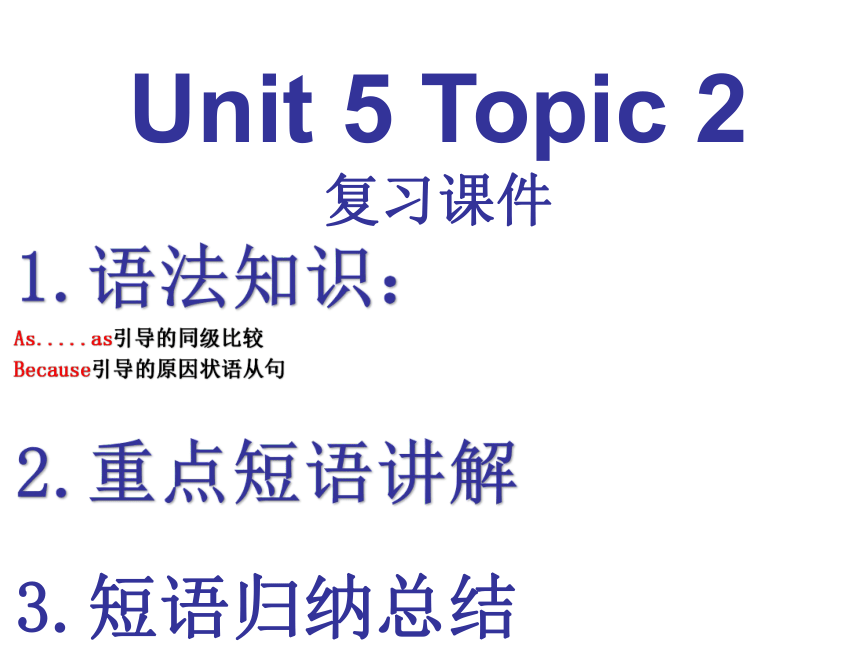 | |
| 格式 | zip | ||
| 文件大小 | 356.1KB | ||
| 资源类型 | 教案 | ||
| 版本资源 | 仁爱科普版 | ||
| 科目 | 英语 | ||
| 更新时间 | 2020-05-08 22:50:09 | ||
图片预览

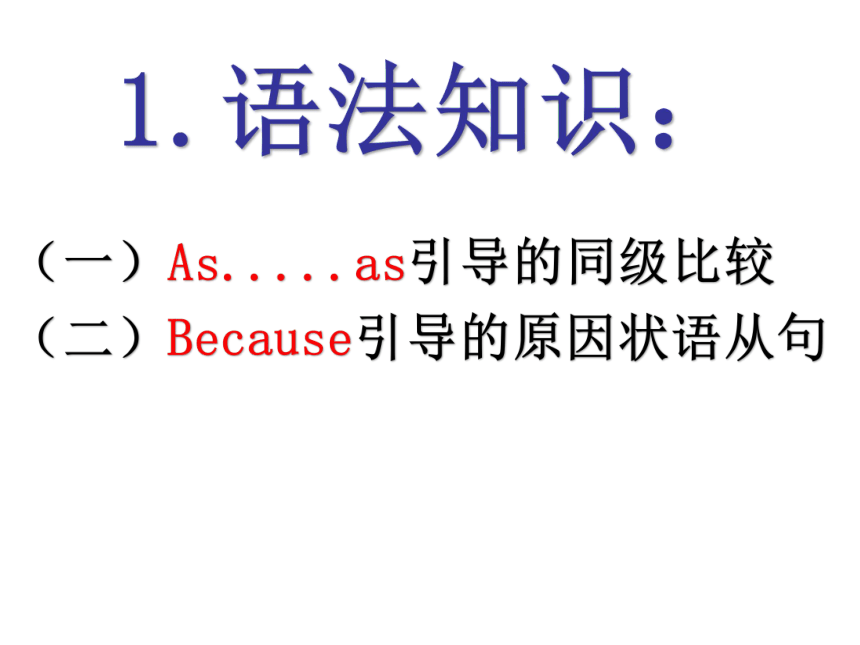
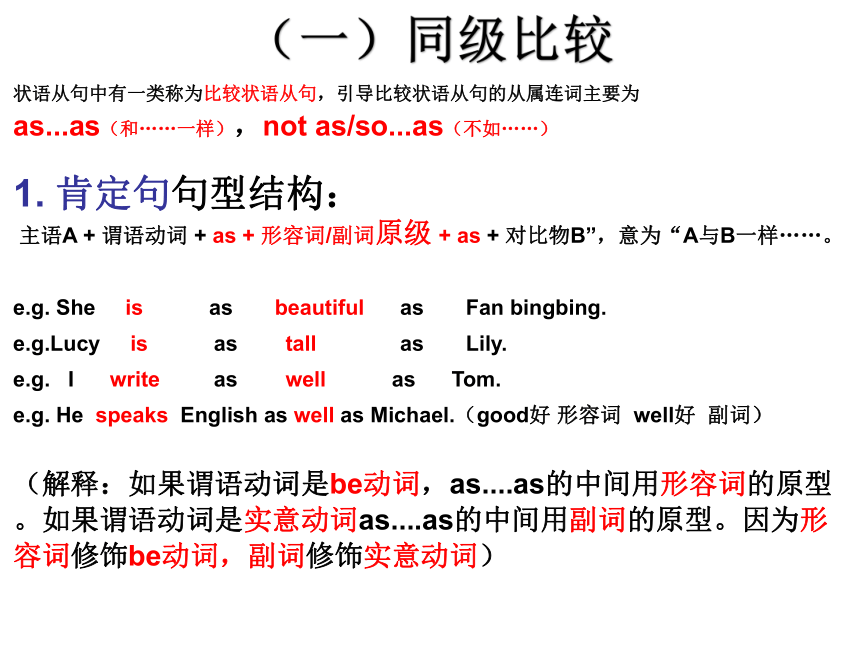

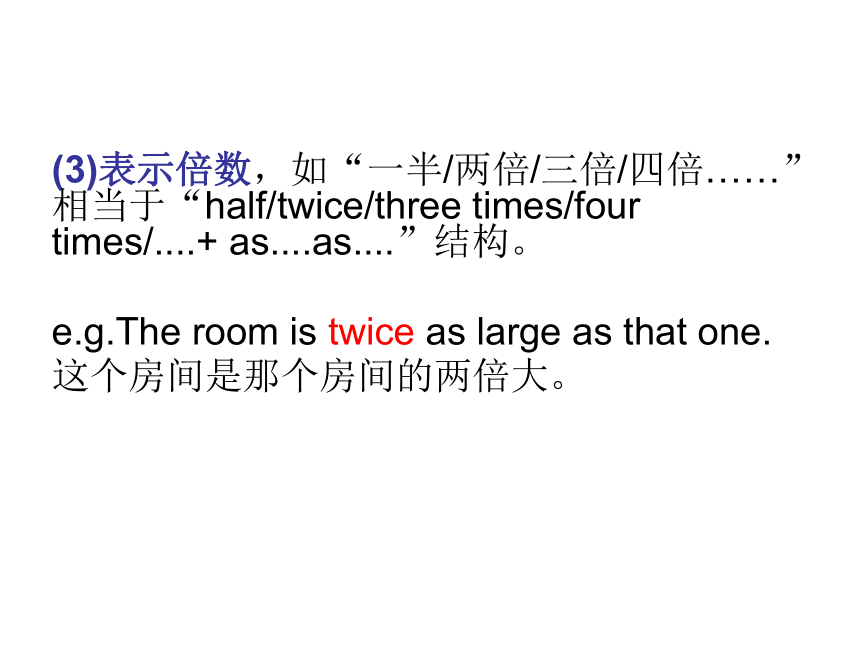
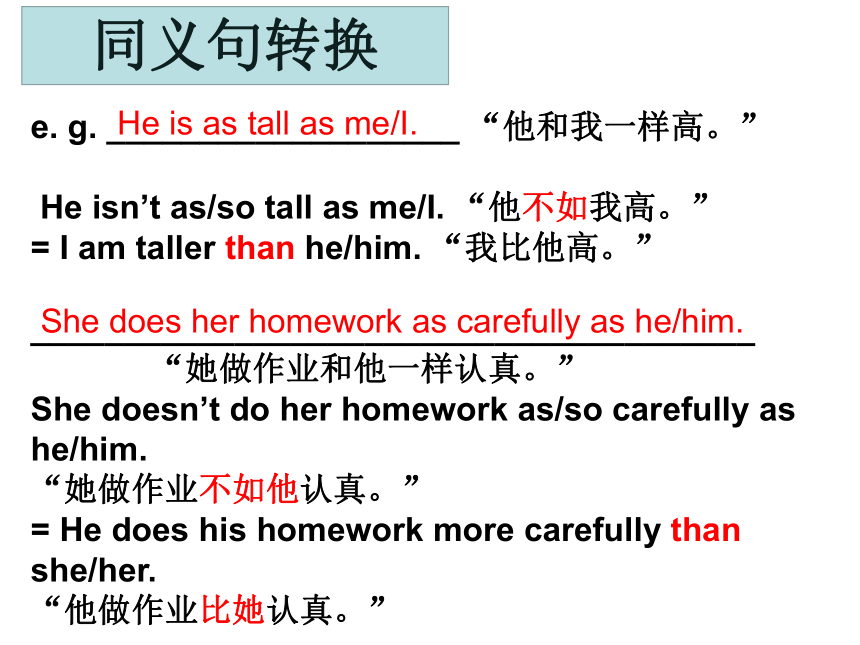
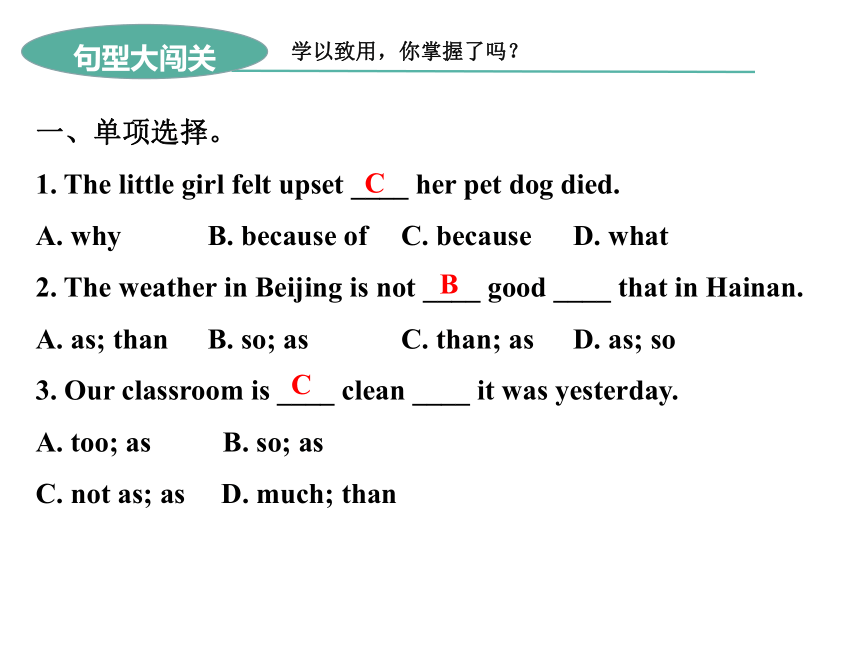
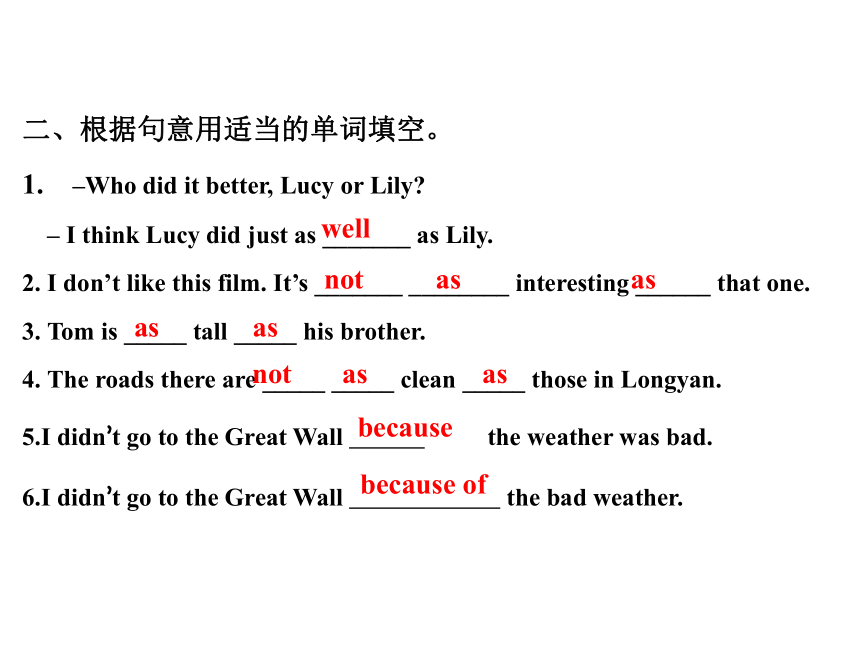
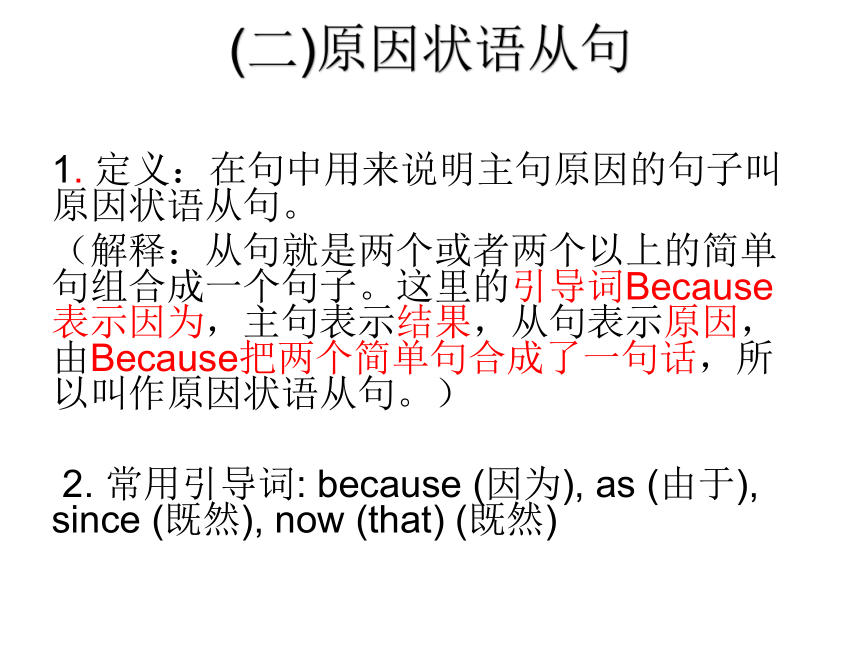
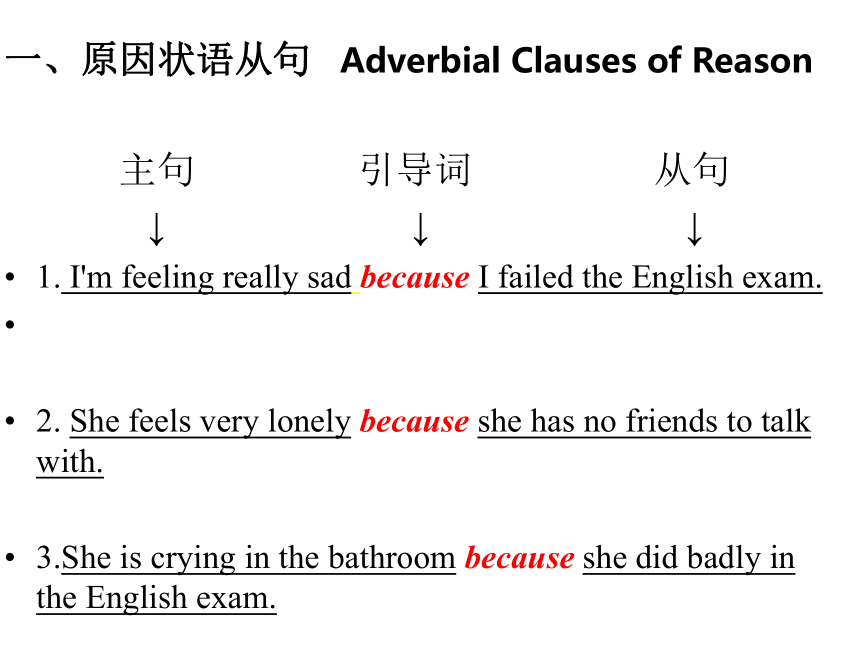
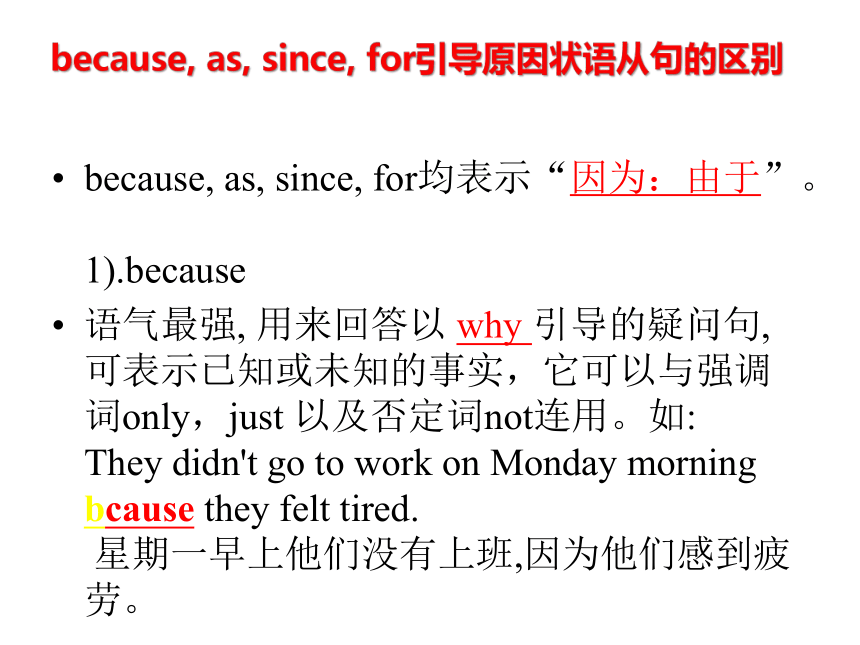
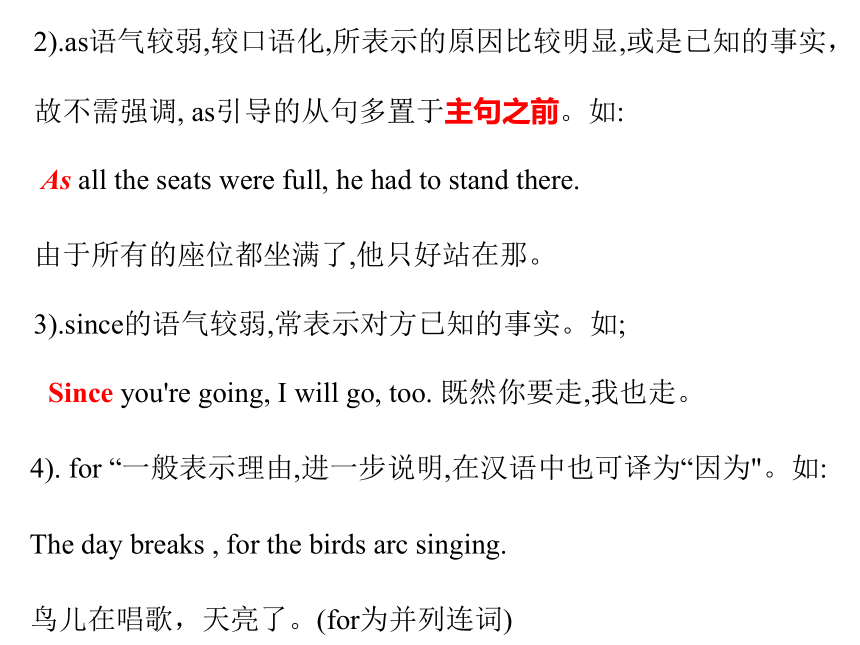
文档简介
(共34张PPT)
Unit 5 Topic 2
复习课件
1.语法知识:
As.....as引导的同级比较
Because引导的原因状语从句
2.重点短语讲解
3.短语归纳总结
1.语法知识:
(一)As.....as引导的同级比较
(二)Because引导的原因状语从句
(一)同级比较
状语从句中有一类称为比较状语从句,引导比较状语从句的从属连词主要为
as...as(和……一样),not as/so...as(不如……)
1. 肯定句句型结构:
主语A + 谓语动词 + as + 形容词/副词原级 + as + 对比物B”,意为“A与B一样……。
e.g. She is as beautiful as Fan bingbing.
e.g.Lucy is as tall as Lily.
e.g. I write as well as Tom.
e.g. He speaks English as well as Michael.(good好 形容词 well好 副词)
(解释:如果谓语动词是be动词,as....as的中间用形容词的原型。如果谓语动词是实意动词as....as的中间用副词的原型。因为形容词修饰be动词,副词修饰实意动词)
否定句句型结构:
主语A + 谓语动词否定形式not + as / so + 形容词/副词原级 + as + 对比物B,
意为“A不如B……”。
e.g. She is not as/so beautiful as Fan bingbing.
e.g.Lucy isn't as tall as Lily.
e.g. I don't write as well as Tom.
e.g. He doesn’t speak English as/so well as Michael.
(解释:如果谓语动词是be动词,变否定句就在be动词后加not。如果谓语动词是实意动词,变否定句就在实意动词前加助动词don't/doesn't/didn't。在否定句中,第一个as可以换成so ,也可以不换,只有在否定句中才能换成so)
(3)表示倍数,如“一半/两倍/三倍/四倍……”相当于“half/twice/three times/four times/....+ as....as....”结构。
e.g.The room is twice as large as that one.
这个房间是那个房间的两倍大。
e. g. ___________________ “他和我一样高。”
He isn’t as/so tall as me/I. “他不如我高。”
= I am taller than he/him. “我比他高。”
_______________________________________
“她做作业和他一样认真。”
She doesn’t do her homework as/so carefully as he/him.
“她做作业不如他认真。”
= He does his homework more carefully than she/her.
“他做作业比她认真。”
He is as tall as me/I.
She does her homework as carefully as he/him.
同义句转换
学以致用,你掌握了吗?
一、单项选择。
1. The little girl felt upset ____ her pet dog died.
A. why B. because of C. because D. what
2. The weather in Beijing is not ____ good ____ that in Hainan.
A. as; than B. so; as C. than; as D. as; so
3. Our classroom is ____ clean ____ it was yesterday.
A. too; as B. so; as
C. not as; as D. much; than
C
B
C
句型大闯关
二、根据句意用适当的单词填空。
–Who did it better, Lucy or Lily?
– I think Lucy did just as _______ as Lily.
2. I don’t like this film. It’s _______ ________ interesting ______ that one.
3. Tom is _____ tall _____ his brother.
4. The roads there are _____ _____ clean _____ those in Longyan.
5.I didn’t go to the Great Wall the weather was bad.?
6.I didn’t go to the Great Wall the bad weather.?
well
not as
as
as as
not as as
because
because of
(二)原因状语从句
1. 定义:在句中用来说明主句原因的句子叫原因状语从句。
(解释:从句就是两个或者两个以上的简单句组合成一个句子。这里的引导词Because表示因为,主句表示结果,从句表示原因,由Because把两个简单句合成了一句话,所以叫作原因状语从句。)
2. 常用引导词: because (因为), as (由于), since (既然), now (that) (既然)
一、原因状语从句 Adverbial Clauses of Reason
主句 引导词 从句
↓ ↓ ↓
1. I'm feeling really sad because I failed the English exam.
2. She feels very lonely because she has no friends to talk with.
3.She is crying in the bathroom because she did badly in the English exam.
because, as, since, for引导原因状语从句的区别
because, as, since, for均表示“因为:由于”。 1).because
语气最强, 用来回答以 why 引导的疑问句,可表示已知或未知的事实,它可以与强调词only,just 以及否定词not连用。如: They didn't go to work on Monday morning bcause they felt tired. 星期一早上他们没有上班,因为他们感到疲劳。
2).as语气较弱,较口语化,所表示的原因比较明显,或是已知的事实,故不需强调, as引导的从句多置于主句之前。如: As all the seats were full, he had to stand there.
由于所有的座位都坐满了,他只好站在那。 3).since的语气较弱,常表示对方已知的事实。如; Since you're going, I will go, too. 既然你要走,我也走。
4). for “一般表示理由,进一步说明,在汉语中也可译为“因为"。如:
The day breaks , for the birds arc singing.
鸟儿在唱歌,天亮了。(for为并列连词)
连接词 语气 位置
(主句前/后) 意义
because 最强 前或后 “原因”;表客观因果关系。
as 较强 前 “由于”;把众人所知的事实当作理由。
since 较弱 前 “既然”;就对方陈述的事实作为理由。
for 次弱 后 “理由”;对某一事实进行推断的理由。
原因状语从句(表示主句所发生的原因或理由)
常见连接词列表
【过手训练】一、填入恰当的连词
1. I didn't go to school yesterday_________I was ill. 2.__________everybody is here, let begin our meeting. 3.______ you are in poor health, you should not stay up late. 4. I asked her to stay to tea,_________I had something to tell her. 5.__________ all the passengers are here, why don’t start at once? 6. Bill won’t make any progress_________he doesn't study harder than before. 7. He might have gone to bed,_________the light went out.
Since
because
As
because
Since
because
for
二、选择恰 当的答案.
1. The man can't get on the bus________there is no room on it. A. though B. because C. until D. so that 2.______her daughter hadn’t come back, ______she looked worried. A. Because, / B. Because, so C. Though, but D. Though, /
3._______ you’ve got a chance, you might make full use of it. A. Since B. After C. Although D. As soon as
4.He found it difficult to read,______his eyesight was beginning to fail. A. and B. for C. but D. or 5. A man cannot smile like a child,______a child smiles with his eyes, while a man smiles with his lips alone.
A. so B. but C. and D. for
B
A
A
B
D
2.重点短语讲解
Section A
1. Anything wrong? 有什么麻烦吗?
此句为省略句,完整的句子是:Is there anything wrong?
e.g. Is there anything wrong with your head?
你的头有什么毛病吗?
2. What seems to be the problem?
到底是怎么回事?
seem to do sth.
动词原形
3. It’s one of my parents’ favorite movies.
它是我父母他们最喜欢的电影之一。
one of +可数名词复数”作主语时,谓语动词用单数形式。
One of the bags is mine. 其中一个书包是我的。
4. She is crying in the bathroom because she did badly in the English exam.因为考不好,她在洗手间里哭呢。
do badly in 在……方面做得不好,与do well in意思相反。
e.g. Why do you think you did so badly in your text? 你认为为什么你考得这么差?
He did very well in English when he was young. 他小时候就很擅长英语。
5. She is very strict with herself. 她对自己要求很严格。
A. be strict with sb. 对……要求严格,后面接人作宾语。
e.g. The teacher is strict with us. 老师对我们要求很严格。
e.g. We shoud be strict with ourselves.我们应该严格要求自己。
B. be strict in sth/doing sth. 在……方面要求严格;后面跟事物
e.g. His father is strict in study.
他的父亲在学习方面对他要求很严格。
e.g.He is strict in doing his homework.他在做家庭作业方面很严格。
6. She feels very lonely because she has no friends to talk with. 她感到很寂寞,因为没有朋友可以聊天。
1)alone与lonely比较:
A. alone既可作副词,又可作形容词,表示一个人,独自,单独,强调数量,常在句中作表语和状语,说明客观存在。
e.g. She left for Shangqiu alone. 她独自去了商丘。(状语)
e.g. He is alone at home.他独自在家。(表语)
B. lonely形容词,表示孤独的,寂寞的,用于形容人的情感和心情,侧重人的心理,常在句中作表语、定语。
e.g. There is a lonely room on the side of the hill. 山坡上有一间孤零零的房子。(定语)
e.g.He is alone at home ,so he feels lonely.他一个人在家,因此他感到孤独,寂寞。(表语)
2)不定式短语to talk with作后置定语修饰friends。
e.g. Mary, I can’t go there with you, because I have a lot of homework to do.
玛丽,我不能和你去那儿,因为我有许多家庭作业要做。
7. I think I should have a talk with her.
have a talk with sb.和某人交谈,talk在这里是名词,这个短语相当于talk with sb.。
e.g. You should have a talk with your son to know what he is thinking about.
=You should talk with your son to know what he is thinking about.
你应该和你儿子谈一谈,弄清楚他在想什么。
类似词组有:have a walk散散步;have a look看一看。
8. So I send this card to cheer you up. 所以我给你发这张电子卡片想让你振作起来。
A. send sth.to sb.=send sb. sth. 把某物寄给某人;
B. send sb./sth. to do sth. 送某人/物做某事;
e.g. I’ll send some workers to help you.我叫几个工人去帮助你。
Section B
1. I’m feeling really sad because I failed the English exam. 我真的很难过,因为我英语考试不及格。
A. fail the exam= not pass the exam 考试不及格;
B. fail不及格,未通过,失败;
e.g. What will you do if you fail?
如果你考试失败打算干什么?
C. fail to do sth. 失败、未能(做到)某事;
e.g. Doctors failed to save the girl's life.
医生们未能保住那女孩的命。
2. Everyone get these feelings at your age. 每个人在你这个年龄都会有这些感受。A. at one’s age 在某人的年龄时;
e.g. Your father began to work at your age. 你父亲在你这个年龄就开始工作了。
B. at the age of... 在……岁时;可以和when互换;
e.g. At the age of seven, he could swim.
= When he was seven, he could swim.
在7岁时,他就会游泳。
3. She always tells me jokes and makes me laugh.
她总是给我讲笑话让我笑。
1)tell jokes ,tell a jike 讲笑话;
make sb. do sth. 意为“让某人做某事”
make/have/ let sb. do sth.
make sb +adj /n
e.g. We made him monitor. 我们选他当班长。
e.g. The boss made him work day and night in the old days. 老板让他没日没夜地工作。
4. I’m sure she would like to be your friend. 我相信她愿意成为你的好朋友。
1) I’m sure... 我相信……;sure为形容词,意为“确信的, 有把握的”。
A. be sure + that从句;
e.g. I’m sure (that) he is right. 我确信他是对的。
B. be sure of +名词,意为“对……有把握”;
e.g. You are sure of a welcome at my house. 无论你什么时候到我家来都会受到欢迎。
C. be sure to do sth. 一定会做……;
e.g. You are sure to win the game. 你们一定会赢得这场比赛。
6. There,there! It’ll be OK. 好啦,好啦!一切都会好起来的。
There, there! 好啦,好啦!there在这里是语气词,表示安慰别人。
7. I find it difficult to learn English well. 我发现学好英语好难。
find/feel/think +it+adj.+to do sth. 此句结构为:动词+宾语+宾语补足语,当不定式作find,feel,think等动词的宾语时,必须用it作形式宾语,相当于其后所接的宾语从句。
e.g. We find it useful to watch English movies. = We find that it is useful to watch English movies.
我们发现看英语电影很有用。
I think it necessary to exercise every day. 我认为每天有必要做锻炼。
Section C
1. How time flies! 是How quickly time flies!的简略形式。时间过得真快!(时光飞逝!)
2. What’s more, I couldn’t sleep as well as usual. 而且我不能像平常一样睡好觉。
1)What’s more 此外,而且,是插入语,是一种独立成分,可置于分句或句子之首、之尾或之中。
e.g. What’s more, he is only a nine- year-old boy. 此外,他只是一个九岁大的男孩。
3. I was not used to anything here. 我不习惯这里的一切。
A. be/get used to sth. 习惯,适应;
e.g. He can’t get used to the weather here.他不习惯这儿的天气。
B. get/be used to doing sth.习惯于做……;
e.g. I am used to getting up early. 我习惯于早起。
C. used to do sth.过去常常做某事(现在不做了);
e.g. I used to watch TV after supper. 以前晚饭后我常看电视。
D. be used to do sth. 被用来做某事;
e.g. Wood is used to make paper. 树木被用来造纸。
4. With the help of my teachers and classmates, I’m getting used to the life here. 在老师和同学们的帮助下,我习惯了这里的生活。
With the help of sb 在某人的帮助下;
e.g. With the help of Tom, my spoken English is better now. 在杰克的帮助下,我的口语好多了。
5. I’m not afraid to talk with others now. My classmates all accept me. 现在我不害怕和其他人讲话了。同学们也都接纳了我。
1)A. be afraid to do sth. 不敢做某事,可与be afraid of doing sth. 转换。
e.g. The little boy is afraid to touch the fire again.
=The little boy is afraid of touching the fire again.
那男孩再也不敢碰火了。
6. Please give my best wishes to your parents. 请代我向你父母问好。
give one’s best wishes to sb. 代某人向某人问好;
e.g. Please give my best wishes to Miss Wang. 请代我向王老师问好。
Section D
1. He refused to play soccer or go to the movies with his friends. 他拒绝和朋友一起去踢足球、看电影。
refuse to do sth.拒绝做某事;
e.g.The student refused to eat fish. 这个学生拒绝吃鱼。
2. He was quite angry with the driver because his car hit his brother, even though it was an accident.他非常生司机的气,因为他的车撞死了他的哥哥,虽然那只是个意外。
1) A. be angry with sb. 生某人的气;
e.g.Please don’t be angry with me. It wasn’t my fault. 请不要冲我发脾气,不是我的错。
B. be angry at/about sth. 因为某事而生气;
e.g.The passengers were angry at/ about the delay. 延误使乘客气愤不已。
2)A. even though = even if 虽然,尽管,即使
e.g. I’ll help you, even though/if I don’t sleep for a night.
即使我一夜不睡觉,也要帮助你。
B. though还有“虽然,可是,纵然”之意,引导让步状语从句,不与but在同一个句子当中连用,与because, so用法相同。
e.g. Though it was dark outside, he still went to the factory.
=It was dark outside, but he still went to the factory. 虽然外面很黑,但他还是去了工厂。
3. Now he still misses his brother, but he doesn’t hate the driver any longer.
现在他仍然想念他的哥哥,但是他已经不再恨那位司机了。
A. not...any longer = no longer 指时间上不再延长,多与持续性动词连用。
e.g. He didn’t live in Beijing any longer. = He no longer lived in Beijing.
他不再住在北京了。
B. not...any more = no more指程度上或做某事的次数不再增加,多与短暂性动词连用。
e.g. You will not see him any more. = You will no more see him.
你将再也见不到他了。
4. At first, How did Jeff deal with his sadness? 刚开始杰夫是怎样处理自己的忧伤的?
1)at first 首先,起初;
2)deal with = do with 处理,解决
3.短语归纳总结
1. look worried 看上去很焦急;
2. Anything wrong? 有什么麻烦吗?
3. be sorry to do sth. 很抱歉做某事;
4. seem to be 好像是……;
5. do badly in 在……方面做得不好;
do well in 在……方面做得好;
6. be strict with 对……要求严格;
be strict in sth/doing. 在……方面要求严格;
7. have a talk with sb.= talk with 和某人交谈;
8. be worried about sb. 担心某人;
9. fall down 坍塌;
10. send sth.to sb.=send sb. sth. 把某物寄给某人;
11. Take it easy. 别紧张,别着急。
12. try to do sth. 尽力做某事;
try doing sth. 尝试做某事;
try not to do sth. 尽量不做某事;
13. talk to others 和别人聊天;
14. work harder 更加努力;
15. do better 做的更好;
16. the English exam 英语考试;
17. fail the exam= not pass the exam 考试不及格;
fail to do sth. 失败、未能(做到)某事;
18. at one’s age 在某人的年龄时;
19. at the age of... 在……岁时;
20. make friends with sb. 和某人教朋友;
21. tell jokes 讲笑话;
22.be sure + that从句; 确信……;
be sure of +名词 对……有把握;
be sure to do sth. 一定会做……;
23. have a good rest 好好休息;
24. become one’s friend 成为某人的朋友;
25. have no friends 没有朋友;
26. miss one’s family 想家;
27. know little about Chinese 了解汉语少;
28. call one’ parents often 常给父母打电话;
29. find new friends 找到新朋友;
30. ask.sb. for help 向某人求助;
31. What’s more 此外,而且;
32. make faces 做鬼脸;
33. all the time 一直;
34. at first 首先,起初;
35. deal with = do with 处理,解决;
36. go mad 发疯;
37. elder brother 哥哥;
38. in a car accident 在车祸中;
39. refuse to do sth. 拒绝做某事;
40. be angry with sb. 生某人的气;
be angry at/about sth. 因为某事而生气;
41. even though = even if 即使;
42. not...any longer = no longer 不再(时间上的);
not...any more = no more 不再(频率上的);
43. make sb./sth.+ do/adj. 使某人做某事/处在…状态;
44. as+adj.\adv.原级+as 与……一样;
not as\so+adj.\adv.原级+as 与……不一样;
45. as usual 像平常一样;
46. be used to sth. 习惯,适应;
get/be used to doing sth. 习惯于做……;
used to do sth. 过去常常做某事(现在不做了);
47.With the help of sb 在某人的帮助下;
48. be afraid to do sth. =be afraid of doing sth. 不敢做某事;
49. give one’s best wishes to sb. 代某人向某人问好;
Unit 5 Topic 2
复习课件
1.语法知识:
As.....as引导的同级比较
Because引导的原因状语从句
2.重点短语讲解
3.短语归纳总结
1.语法知识:
(一)As.....as引导的同级比较
(二)Because引导的原因状语从句
(一)同级比较
状语从句中有一类称为比较状语从句,引导比较状语从句的从属连词主要为
as...as(和……一样),not as/so...as(不如……)
1. 肯定句句型结构:
主语A + 谓语动词 + as + 形容词/副词原级 + as + 对比物B”,意为“A与B一样……。
e.g. She is as beautiful as Fan bingbing.
e.g.Lucy is as tall as Lily.
e.g. I write as well as Tom.
e.g. He speaks English as well as Michael.(good好 形容词 well好 副词)
(解释:如果谓语动词是be动词,as....as的中间用形容词的原型。如果谓语动词是实意动词as....as的中间用副词的原型。因为形容词修饰be动词,副词修饰实意动词)
否定句句型结构:
主语A + 谓语动词否定形式not + as / so + 形容词/副词原级 + as + 对比物B,
意为“A不如B……”。
e.g. She is not as/so beautiful as Fan bingbing.
e.g.Lucy isn't as tall as Lily.
e.g. I don't write as well as Tom.
e.g. He doesn’t speak English as/so well as Michael.
(解释:如果谓语动词是be动词,变否定句就在be动词后加not。如果谓语动词是实意动词,变否定句就在实意动词前加助动词don't/doesn't/didn't。在否定句中,第一个as可以换成so ,也可以不换,只有在否定句中才能换成so)
(3)表示倍数,如“一半/两倍/三倍/四倍……”相当于“half/twice/three times/four times/....+ as....as....”结构。
e.g.The room is twice as large as that one.
这个房间是那个房间的两倍大。
e. g. ___________________ “他和我一样高。”
He isn’t as/so tall as me/I. “他不如我高。”
= I am taller than he/him. “我比他高。”
_______________________________________
“她做作业和他一样认真。”
She doesn’t do her homework as/so carefully as he/him.
“她做作业不如他认真。”
= He does his homework more carefully than she/her.
“他做作业比她认真。”
He is as tall as me/I.
She does her homework as carefully as he/him.
同义句转换
学以致用,你掌握了吗?
一、单项选择。
1. The little girl felt upset ____ her pet dog died.
A. why B. because of C. because D. what
2. The weather in Beijing is not ____ good ____ that in Hainan.
A. as; than B. so; as C. than; as D. as; so
3. Our classroom is ____ clean ____ it was yesterday.
A. too; as B. so; as
C. not as; as D. much; than
C
B
C
句型大闯关
二、根据句意用适当的单词填空。
–Who did it better, Lucy or Lily?
– I think Lucy did just as _______ as Lily.
2. I don’t like this film. It’s _______ ________ interesting ______ that one.
3. Tom is _____ tall _____ his brother.
4. The roads there are _____ _____ clean _____ those in Longyan.
5.I didn’t go to the Great Wall the weather was bad.?
6.I didn’t go to the Great Wall the bad weather.?
well
not as
as
as as
not as as
because
because of
(二)原因状语从句
1. 定义:在句中用来说明主句原因的句子叫原因状语从句。
(解释:从句就是两个或者两个以上的简单句组合成一个句子。这里的引导词Because表示因为,主句表示结果,从句表示原因,由Because把两个简单句合成了一句话,所以叫作原因状语从句。)
2. 常用引导词: because (因为), as (由于), since (既然), now (that) (既然)
一、原因状语从句 Adverbial Clauses of Reason
主句 引导词 从句
↓ ↓ ↓
1. I'm feeling really sad because I failed the English exam.
2. She feels very lonely because she has no friends to talk with.
3.She is crying in the bathroom because she did badly in the English exam.
because, as, since, for引导原因状语从句的区别
because, as, since, for均表示“因为:由于”。 1).because
语气最强, 用来回答以 why 引导的疑问句,可表示已知或未知的事实,它可以与强调词only,just 以及否定词not连用。如: They didn't go to work on Monday morning bcause they felt tired. 星期一早上他们没有上班,因为他们感到疲劳。
2).as语气较弱,较口语化,所表示的原因比较明显,或是已知的事实,故不需强调, as引导的从句多置于主句之前。如: As all the seats were full, he had to stand there.
由于所有的座位都坐满了,他只好站在那。 3).since的语气较弱,常表示对方已知的事实。如; Since you're going, I will go, too. 既然你要走,我也走。
4). for “一般表示理由,进一步说明,在汉语中也可译为“因为"。如:
The day breaks , for the birds arc singing.
鸟儿在唱歌,天亮了。(for为并列连词)
连接词 语气 位置
(主句前/后) 意义
because 最强 前或后 “原因”;表客观因果关系。
as 较强 前 “由于”;把众人所知的事实当作理由。
since 较弱 前 “既然”;就对方陈述的事实作为理由。
for 次弱 后 “理由”;对某一事实进行推断的理由。
原因状语从句(表示主句所发生的原因或理由)
常见连接词列表
【过手训练】一、填入恰当的连词
1. I didn't go to school yesterday_________I was ill. 2.__________everybody is here, let begin our meeting. 3.______ you are in poor health, you should not stay up late. 4. I asked her to stay to tea,_________I had something to tell her. 5.__________ all the passengers are here, why don’t start at once? 6. Bill won’t make any progress_________he doesn't study harder than before. 7. He might have gone to bed,_________the light went out.
Since
because
As
because
Since
because
for
二、选择恰 当的答案.
1. The man can't get on the bus________there is no room on it. A. though B. because C. until D. so that 2.______her daughter hadn’t come back, ______she looked worried. A. Because, / B. Because, so C. Though, but D. Though, /
3._______ you’ve got a chance, you might make full use of it. A. Since B. After C. Although D. As soon as
4.He found it difficult to read,______his eyesight was beginning to fail. A. and B. for C. but D. or 5. A man cannot smile like a child,______a child smiles with his eyes, while a man smiles with his lips alone.
A. so B. but C. and D. for
B
A
A
B
D
2.重点短语讲解
Section A
1. Anything wrong? 有什么麻烦吗?
此句为省略句,完整的句子是:Is there anything wrong?
e.g. Is there anything wrong with your head?
你的头有什么毛病吗?
2. What seems to be the problem?
到底是怎么回事?
seem to do sth.
动词原形
3. It’s one of my parents’ favorite movies.
它是我父母他们最喜欢的电影之一。
one of +可数名词复数”作主语时,谓语动词用单数形式。
One of the bags is mine. 其中一个书包是我的。
4. She is crying in the bathroom because she did badly in the English exam.因为考不好,她在洗手间里哭呢。
do badly in 在……方面做得不好,与do well in意思相反。
e.g. Why do you think you did so badly in your text? 你认为为什么你考得这么差?
He did very well in English when he was young. 他小时候就很擅长英语。
5. She is very strict with herself. 她对自己要求很严格。
A. be strict with sb. 对……要求严格,后面接人作宾语。
e.g. The teacher is strict with us. 老师对我们要求很严格。
e.g. We shoud be strict with ourselves.我们应该严格要求自己。
B. be strict in sth/doing sth. 在……方面要求严格;后面跟事物
e.g. His father is strict in study.
他的父亲在学习方面对他要求很严格。
e.g.He is strict in doing his homework.他在做家庭作业方面很严格。
6. She feels very lonely because she has no friends to talk with. 她感到很寂寞,因为没有朋友可以聊天。
1)alone与lonely比较:
A. alone既可作副词,又可作形容词,表示一个人,独自,单独,强调数量,常在句中作表语和状语,说明客观存在。
e.g. She left for Shangqiu alone. 她独自去了商丘。(状语)
e.g. He is alone at home.他独自在家。(表语)
B. lonely形容词,表示孤独的,寂寞的,用于形容人的情感和心情,侧重人的心理,常在句中作表语、定语。
e.g. There is a lonely room on the side of the hill. 山坡上有一间孤零零的房子。(定语)
e.g.He is alone at home ,so he feels lonely.他一个人在家,因此他感到孤独,寂寞。(表语)
2)不定式短语to talk with作后置定语修饰friends。
e.g. Mary, I can’t go there with you, because I have a lot of homework to do.
玛丽,我不能和你去那儿,因为我有许多家庭作业要做。
7. I think I should have a talk with her.
have a talk with sb.和某人交谈,talk在这里是名词,这个短语相当于talk with sb.。
e.g. You should have a talk with your son to know what he is thinking about.
=You should talk with your son to know what he is thinking about.
你应该和你儿子谈一谈,弄清楚他在想什么。
类似词组有:have a walk散散步;have a look看一看。
8. So I send this card to cheer you up. 所以我给你发这张电子卡片想让你振作起来。
A. send sth.to sb.=send sb. sth. 把某物寄给某人;
B. send sb./sth. to do sth. 送某人/物做某事;
e.g. I’ll send some workers to help you.我叫几个工人去帮助你。
Section B
1. I’m feeling really sad because I failed the English exam. 我真的很难过,因为我英语考试不及格。
A. fail the exam= not pass the exam 考试不及格;
B. fail不及格,未通过,失败;
e.g. What will you do if you fail?
如果你考试失败打算干什么?
C. fail to do sth. 失败、未能(做到)某事;
e.g. Doctors failed to save the girl's life.
医生们未能保住那女孩的命。
2. Everyone get these feelings at your age. 每个人在你这个年龄都会有这些感受。A. at one’s age 在某人的年龄时;
e.g. Your father began to work at your age. 你父亲在你这个年龄就开始工作了。
B. at the age of... 在……岁时;可以和when互换;
e.g. At the age of seven, he could swim.
= When he was seven, he could swim.
在7岁时,他就会游泳。
3. She always tells me jokes and makes me laugh.
她总是给我讲笑话让我笑。
1)tell jokes ,tell a jike 讲笑话;
make sb. do sth. 意为“让某人做某事”
make/have/ let sb. do sth.
make sb +adj /n
e.g. We made him monitor. 我们选他当班长。
e.g. The boss made him work day and night in the old days. 老板让他没日没夜地工作。
4. I’m sure she would like to be your friend. 我相信她愿意成为你的好朋友。
1) I’m sure... 我相信……;sure为形容词,意为“确信的, 有把握的”。
A. be sure + that从句;
e.g. I’m sure (that) he is right. 我确信他是对的。
B. be sure of +名词,意为“对……有把握”;
e.g. You are sure of a welcome at my house. 无论你什么时候到我家来都会受到欢迎。
C. be sure to do sth. 一定会做……;
e.g. You are sure to win the game. 你们一定会赢得这场比赛。
6. There,there! It’ll be OK. 好啦,好啦!一切都会好起来的。
There, there! 好啦,好啦!there在这里是语气词,表示安慰别人。
7. I find it difficult to learn English well. 我发现学好英语好难。
find/feel/think +it+adj.+to do sth. 此句结构为:动词+宾语+宾语补足语,当不定式作find,feel,think等动词的宾语时,必须用it作形式宾语,相当于其后所接的宾语从句。
e.g. We find it useful to watch English movies. = We find that it is useful to watch English movies.
我们发现看英语电影很有用。
I think it necessary to exercise every day. 我认为每天有必要做锻炼。
Section C
1. How time flies! 是How quickly time flies!的简略形式。时间过得真快!(时光飞逝!)
2. What’s more, I couldn’t sleep as well as usual. 而且我不能像平常一样睡好觉。
1)What’s more 此外,而且,是插入语,是一种独立成分,可置于分句或句子之首、之尾或之中。
e.g. What’s more, he is only a nine- year-old boy. 此外,他只是一个九岁大的男孩。
3. I was not used to anything here. 我不习惯这里的一切。
A. be/get used to sth. 习惯,适应;
e.g. He can’t get used to the weather here.他不习惯这儿的天气。
B. get/be used to doing sth.习惯于做……;
e.g. I am used to getting up early. 我习惯于早起。
C. used to do sth.过去常常做某事(现在不做了);
e.g. I used to watch TV after supper. 以前晚饭后我常看电视。
D. be used to do sth. 被用来做某事;
e.g. Wood is used to make paper. 树木被用来造纸。
4. With the help of my teachers and classmates, I’m getting used to the life here. 在老师和同学们的帮助下,我习惯了这里的生活。
With the help of sb 在某人的帮助下;
e.g. With the help of Tom, my spoken English is better now. 在杰克的帮助下,我的口语好多了。
5. I’m not afraid to talk with others now. My classmates all accept me. 现在我不害怕和其他人讲话了。同学们也都接纳了我。
1)A. be afraid to do sth. 不敢做某事,可与be afraid of doing sth. 转换。
e.g. The little boy is afraid to touch the fire again.
=The little boy is afraid of touching the fire again.
那男孩再也不敢碰火了。
6. Please give my best wishes to your parents. 请代我向你父母问好。
give one’s best wishes to sb. 代某人向某人问好;
e.g. Please give my best wishes to Miss Wang. 请代我向王老师问好。
Section D
1. He refused to play soccer or go to the movies with his friends. 他拒绝和朋友一起去踢足球、看电影。
refuse to do sth.拒绝做某事;
e.g.The student refused to eat fish. 这个学生拒绝吃鱼。
2. He was quite angry with the driver because his car hit his brother, even though it was an accident.他非常生司机的气,因为他的车撞死了他的哥哥,虽然那只是个意外。
1) A. be angry with sb. 生某人的气;
e.g.Please don’t be angry with me. It wasn’t my fault. 请不要冲我发脾气,不是我的错。
B. be angry at/about sth. 因为某事而生气;
e.g.The passengers were angry at/ about the delay. 延误使乘客气愤不已。
2)A. even though = even if 虽然,尽管,即使
e.g. I’ll help you, even though/if I don’t sleep for a night.
即使我一夜不睡觉,也要帮助你。
B. though还有“虽然,可是,纵然”之意,引导让步状语从句,不与but在同一个句子当中连用,与because, so用法相同。
e.g. Though it was dark outside, he still went to the factory.
=It was dark outside, but he still went to the factory. 虽然外面很黑,但他还是去了工厂。
3. Now he still misses his brother, but he doesn’t hate the driver any longer.
现在他仍然想念他的哥哥,但是他已经不再恨那位司机了。
A. not...any longer = no longer 指时间上不再延长,多与持续性动词连用。
e.g. He didn’t live in Beijing any longer. = He no longer lived in Beijing.
他不再住在北京了。
B. not...any more = no more指程度上或做某事的次数不再增加,多与短暂性动词连用。
e.g. You will not see him any more. = You will no more see him.
你将再也见不到他了。
4. At first, How did Jeff deal with his sadness? 刚开始杰夫是怎样处理自己的忧伤的?
1)at first 首先,起初;
2)deal with = do with 处理,解决
3.短语归纳总结
1. look worried 看上去很焦急;
2. Anything wrong? 有什么麻烦吗?
3. be sorry to do sth. 很抱歉做某事;
4. seem to be 好像是……;
5. do badly in 在……方面做得不好;
do well in 在……方面做得好;
6. be strict with 对……要求严格;
be strict in sth/doing. 在……方面要求严格;
7. have a talk with sb.= talk with 和某人交谈;
8. be worried about sb. 担心某人;
9. fall down 坍塌;
10. send sth.to sb.=send sb. sth. 把某物寄给某人;
11. Take it easy. 别紧张,别着急。
12. try to do sth. 尽力做某事;
try doing sth. 尝试做某事;
try not to do sth. 尽量不做某事;
13. talk to others 和别人聊天;
14. work harder 更加努力;
15. do better 做的更好;
16. the English exam 英语考试;
17. fail the exam= not pass the exam 考试不及格;
fail to do sth. 失败、未能(做到)某事;
18. at one’s age 在某人的年龄时;
19. at the age of... 在……岁时;
20. make friends with sb. 和某人教朋友;
21. tell jokes 讲笑话;
22.be sure + that从句; 确信……;
be sure of +名词 对……有把握;
be sure to do sth. 一定会做……;
23. have a good rest 好好休息;
24. become one’s friend 成为某人的朋友;
25. have no friends 没有朋友;
26. miss one’s family 想家;
27. know little about Chinese 了解汉语少;
28. call one’ parents often 常给父母打电话;
29. find new friends 找到新朋友;
30. ask.sb. for help 向某人求助;
31. What’s more 此外,而且;
32. make faces 做鬼脸;
33. all the time 一直;
34. at first 首先,起初;
35. deal with = do with 处理,解决;
36. go mad 发疯;
37. elder brother 哥哥;
38. in a car accident 在车祸中;
39. refuse to do sth. 拒绝做某事;
40. be angry with sb. 生某人的气;
be angry at/about sth. 因为某事而生气;
41. even though = even if 即使;
42. not...any longer = no longer 不再(时间上的);
not...any more = no more 不再(频率上的);
43. make sb./sth.+ do/adj. 使某人做某事/处在…状态;
44. as+adj.\adv.原级+as 与……一样;
not as\so+adj.\adv.原级+as 与……不一样;
45. as usual 像平常一样;
46. be used to sth. 习惯,适应;
get/be used to doing sth. 习惯于做……;
used to do sth. 过去常常做某事(现在不做了);
47.With the help of sb 在某人的帮助下;
48. be afraid to do sth. =be afraid of doing sth. 不敢做某事;
49. give one’s best wishes to sb. 代某人向某人问好;
同课章节目录
- Unit 5 Feeling excited
- Topic 1 You look excited
- Topic 2 I’m feeling better now.
- Topic 3 Many things can affect our feelings.
- Unit 6 Enjoying Cycling
- Topic 1 We're going on a three-day visit to Mount
- Topic 2 How about exploring Tian’anmen Square?
- Topic 3 Bicycle riding is good exercise.
- Unit 7 Food festival
- Topic 1 We’re preparing for a food festival.
- Topic 2 I’m not sure whether I can cook it well.
- Topic 3 I Cooked the Most Successfully
- Unit 8 Our Clothes
- Topic 1 We will have a class fashion show.
- Topic 2 We can design our own uniforms.
- Topic 3 He said the fashion show was wonderful.
